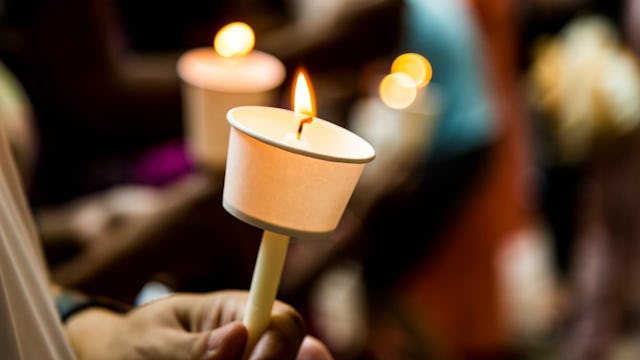I'm A Humanist, And This Is What Religion Means To Me

I don’t believe in God.
Well, to be more precise, I do believe in a kind of god – just not in the way most people think when they hear that word.
I’m a humanist. Agnostic-ish. A non-Christian.
My holy book is not the Bible, but the words of folks like Rumi, Maya Angelou, and Mary Oliver.
I find god (lower case g) in the mountains and oceans, in laughter and singing, in my grandma’s apple dumplings and standing ovations at the end of a theater performance.
By most accounts, and in most ways, I would meet that emerging demographic who considers themselves to be spiritual but not religious.
But here’s the thing: I am spiritual and religious. Most Sunday mornings you can find me sitting in our local Unitarian Universalist church, and on many weeknights you can find me tending to church business of some kind.
But why? Why do I go to church if I don’t believe in a bearded man in the sky? Why do I consider myself religious if I’m not part of a “mainstream” religion? Why?
Religion looks different to different people of different faiths – and my religion looks like a group of people coming together with shared values and principles to try to be better people and make a better, kinder, more accepting world.
Some people might get all the spiritual sustenance they need without a faith community, and that’s great.
And some people might have had traumatic experiences in the name of “religion.” Some people have scars that are too deep to fade. And for that, I am deeply sorry. All I can say, is we’re not all like that. Not all religions are like that, but that doesn’t make your pain and anger any less valid.
Sometimes I hesitate to say that I’m “religious” or that I go to “church” because of the connotations those two words conjure, and the religion I am part of and the church I go to are so different from the stereotypical assumptions they should almost be different words entirely. But ultimately, it’s what we’re left with.
But rest assured, the assumption that all religions are about a belief in God – or even about a belief in anything, for that matter – is false. The idea that all religions are about conservative ideals is just as narrow as the ideas held by those same religions that we malign (often for good reason).
So even though I don’t believe in God in the mono-theistic way most people define it, I haven’t completely written off religion.
And this is why.
Because my religion doesn’t include dogma or a set of rules; it doesn’t tell me how to live, but rather how to love.
Because the church I call home doesn’t ask that I believe in a certain deity, but rather, calls me to be a better person and then helps me to actually do that.
Because my faith doesn’t dictate a set of beliefs, but believes in taking care of each other.
Because my faith calls us to come together to be a voice of progressive ideals, tolerance and acceptance so that, collectively, we can drown out the voices of conservatism, intolerance and bigotry.
Because my church gives our kids (and adults for that matter) the language to talk about spirituality and faith while empowering them to come to their own conclusions about it.
Because my church is filled with people who understand we’re all messy and complicated, that the world is broken and hurting, and that this is why we need each other.
Because my faith knows we’re all worthy, and we don’t need to be “saved.”
Because when I (and others) screw up, my church doesn’t say “shame on you,” but rather “we love you, let’s fix this together.”
Because my faith — and more importantly the beautiful people of my church, the ones I sit next to on Sunday mornings and in weeknight meetings — know that we can’t do anything alone.
We are all in this together, and we are all worthy of love.
This article was originally published on